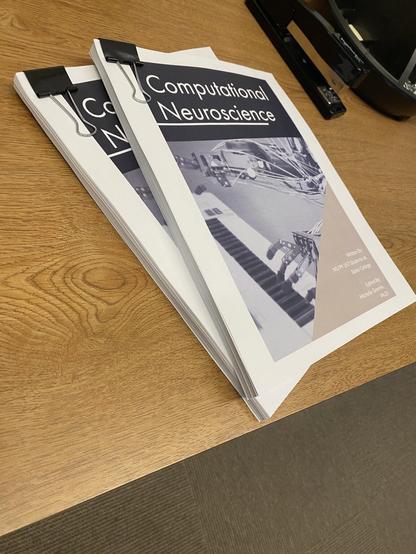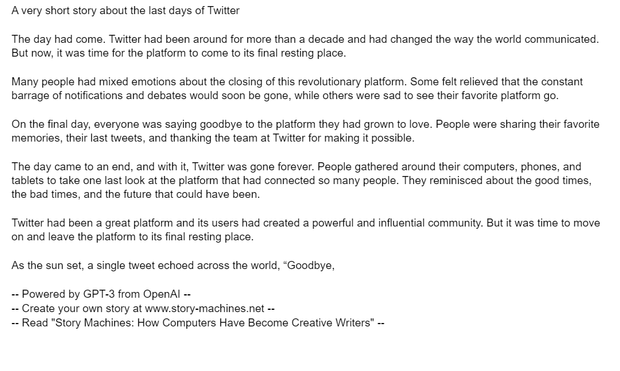10 minutes chats – Generative AI from Monash Education Academy
@timbocop talks to @sharplm about reframing our thinking of generative artificial intelligence.
Ping @bron .
Ta, @gamerlearner . We'll miss your 'must reads'.
https://www.monash.edu/learning-teaching/TeachHQ/Teaching-practices/artificial-intelligence/10-minute-chats-on-generative-ai
Emeritus Professor of #edtech at #OpenUniversity. Curious about innovative #Pedagogy, #AI and #Education, #OpenScience, #Creativity and #Writing. Author of "Practical Pedagogy: 40 New Ways to Teach and Learn" and co-author of "Story Machines: How Computers Have Become Creative Writers".
Thanks for sharing @sharplm - UNESCO report on #chatgpt and #AI in higher education https://www.iesalc.unesco.org/wp-content/uploads/2023/04/ChatGPT-and-Artificial-Intelligence-in-higher-education-Quick-Start-guide_EN_FINAL.pdf #lxdesign
I agree with @sharplm who wrote on Twitter:
“OpenAI has just released APIs for ChatGPT and Whisper (speech to text). Expect #edtech developers to pile in, with apps for conversational language learning, quizzes, creative (and essay) writing. Add speech for educational toys, virtual worlds, tutoring...”
Some of that will be good, a lot will be bad, but the genie is definitely out of the bottle.
https://openai.com/blog/introducing-chatgpt-and-whisper-apis
@tomstafford @Sebschmoller I agree the guidelines are flawed, which is why I have been careful to call them "draft guidelines". I did it in large part to demonstrate the possibility for AI generators to provoke constructive debate and provide a basis for improvement, both valuable for learning.
Over on Twitter Mike Sharples posted link to this paper. (https://twitter.com/sharplm/status/1621537532163792896?s=20&t=XZQCRYerFEV_gUE1cf1Iow)
Worth a read if this is your interest (genesis of technological ideas):
Another very interesting thread on the use #gpt3 (post from twitter), this time writing an #academic paper. @sharplm https://twitter.com/sharplm/status/1603659898948132865?t=4ez1spMCx_BxAYvWX174aw&s=08
@dlongm01 Good to see you on Mastodon! And glad it performed its tricks! The more precise the prompt, the better the result. And yes, I have a limit of 250 tokens, imposed by OpenAI (though I think they may have relaxed that now).
Printing my students’ open textbook! 12 chapters, 179 pages of awesomeness!
#neuroscience #computationalneuroscience #openeducation
@tltgisch @serenissimaj The latest version of GPT-3 can certainly follow a story arc if that's given as a prompt, can produce tellable short stories around a theme, and can imitate literary styles. Whether that results in literature can, and will, be debated. In 1977, James Meehan coined the term "mis-spun" tales for computer-generated "wrong" stories that revealed something about the limits of machine creativity. Maybe GPT-3's "fake stories" are bad news but good learning.
@serenissimaj I hope nobody will object to their AI-generated stories forming part of your research. GPT-3 wasn't trained on any genre. I simply called on the standard GPT-3, with an additional prompt "Write an imaginative short story with the title" added before the title.
@tltgisch @serenissimaj That's superb. I hope you enjoyed, and were not troubled by, the experience.
For one day only (because it's more expensive for me), I've powered my story generator at https://story-machines.net with the latest GPT-3 davinci-003 model. Give it a try, to generate an opening for a short story. It's free, with no registration needed. #education #creativity #edtech #stories #ai
RT @neilmosley5@twitter.com
BREAKING - Big news in the world of online education - Global University Systems (owner of Arden University & University of Law et al) set to acquire UK online education company FutureLearn with the deal to be announced shortly....#onlinelearning #highered #edtech #futurelearn https://twitter.com/MarkKleinmanSky/status/1597699391510679553
🐦🔗: https://twitter.com/neilmosley5/status/1597896604803280896
@teovaldes I'm glad you found my article helpful. It's still very early days for exploring this powerful, and disruptive, technology. Do please let us know the results of your explorations.
@martin @serenissimaj It's still very early days. Here's my view on implications for education, in an article for AIED journal. Also, our book "Story Machines: How Computers Have Become Creative Writers" discussed some wider implications. https://link.springer.com/article/10.1007/s40593-022-00300-7
@arnicas @Riedl
Thanks for the link to Mark's talk. There's more on the history of story generators in our book "Story Machines: How Computers Have Become Creative Writers". I also have a paper on the "Eureka" Latin verse machine under review for IEEE Annals of the History of Computing. Happy to send you a draft of that if you're interested.
https://routledge.pub/Story-Machines
@martin Yes, I agree that it's not good to rely on self declarations of "I'm accurate, trust me". Conversely, we shouldn't trust checkers that might catch superficial inaccuracies, such as fake references, but not deeper flaws such as invented research studies. We need new hybrid neuro-symbolic AI models, new independent evidence-checking systems, and a new critical literacy of AI. Big asks!
@martin Is that just papering over the big crack - that LLMs have no internal model of how the world works, and thus are fundamentally devious and amoral? Rather than bolting on secondary services to check accuracy, I suggest we need new neuro-symbolic systems that build cognitive models into their architecture.

